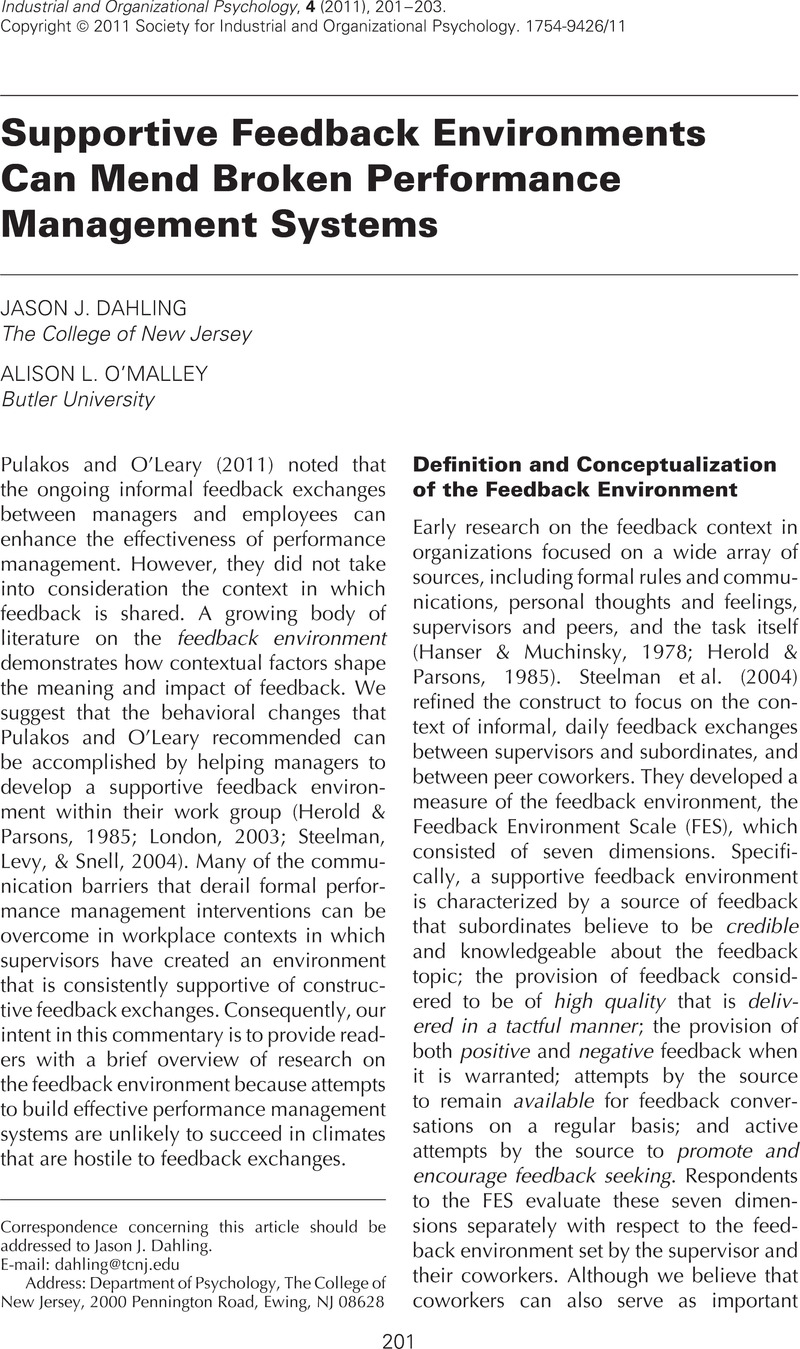Crossref Citations
This article has been cited by the following publications. This list is generated based on data provided by Crossref.
O’LEARY, RYAN S.
and
PULAKOS, ELAINE D.
2011.
Managing Performance Through the Manager-Employee Relationship.
Industrial and Organizational Psychology,
Vol. 4,
Issue. 2,
p.
208.
O’Leary, Ryan S.
and
Pulakos, Elaine D.
2011.
Managing Performance Through the Manager–Employee Relationship.
Industrial and Organizational Psychology,
Vol. 4,
Issue. 2,
p.
208.
Litano, Michael L.
Major, Debra A.
and
Morganson, Valerie J.
2014.
Encyclopedia of Information Science and Technology, Third Edition.
p.
5008.
F. Young, Stephen
and
A. Steelman, Lisa
2014.
The role of feedback in supervisor and workgroup identification.
Personnel Review,
Vol. 43,
Issue. 2,
p.
228.
Bragger, Jennifer D.
Kutcher, Eugene J.
Menier, Amanda
Sessa, Valerie I.
and
Sumner, Kenneth
2014.
Giving Nonselective Downsizing a Performance Review.
Human Resource Development Review,
Vol. 13,
Issue. 1,
p.
58.
Ock, Jisoo
and
Oswald, Frederick L.
2015.
Managing the Interpersonal Aspect of Performance Management.
Industrial and Organizational Psychology,
Vol. 8,
Issue. 1,
p.
111.
Van Waeyenberg, Thomas
Decramer, Adelien
and
Anseel, Frederik
2015.
Home nurses' turnover intentions: the impact of informal supervisory feedback and self‐efficacy.
Journal of Advanced Nursing,
Vol. 71,
Issue. 12,
p.
2867.
Nakai, Yoshie
and
O'Malley, Alison L.
2015.
Feedback to know, to show, or both? A profile approach to the feedback process.
Learning and Individual Differences,
Vol. 43,
Issue. ,
p.
1.
Dahling, Jason
O'Malley, Alison L
and
Chau, Samantha L
2015.
Effects of feedback motives on inquiry and performance.
Journal of Managerial Psychology,
Vol. 30,
Issue. 2,
p.
199.
Chawla, Nitya
Gabriel, Allison S.
Dahling, Jason J.
and
Patel, Kajal
2016.
Feedback Dynamics Are Critical to Improving Performance Management Systems.
Industrial and Organizational Psychology,
Vol. 9,
Issue. 2,
p.
260.
Dahling, Jason J.
Taylor, Samantha Ritchie
Chau, Samantha L.
and
Dwight, Stephen A.
2016.
Does Coaching Matter? A Multilevel Model Linking Managerial Coaching Skill and Frequency to Sales Goal Attainment.
Personnel Psychology,
Vol. 69,
Issue. 4,
p.
863.
Dahling, Jason J.
Gabriel, Allison S.
and
MacGowan, Rebecca
2017.
Understanding typologies of feedback environment perceptions: A latent profile investigation.
Journal of Vocational Behavior,
Vol. 101,
Issue. ,
p.
133.
Gong, Zhenxing
Zhang, Jian
Zhao, Yujia
and
Yin, Lei
2017.
The relationship between feedback environment, feedback orientation, psychological empowerment and burnout among police in China.
Policing: An International Journal of Police Strategies & Management,
Vol. 40,
Issue. 2,
p.
336.
Singh, Anupriya
2018.
Continuous performance-based feedback and justice perceptions: Evidence for mediation by experienced participation.
IIMB Management Review,
Vol. 30,
Issue. 2,
p.
134.
Patel, Kajal R.
Silva, Rebekah A.
and
Dahling, Jason J.
2019.
Feedback at Work.
p.
97.
Aarons, Gregory A.
Askew, Rachel A.
Green, Amy E.
Yalon, Alexis J.
Reeder, Kendal
and
Palinkas, Lawrence A.
2019.
Evidence-based practice adaptation during large-scale implementation: a taxonomy of process and content adaptations.
Journal of Children's Services,
Vol. 14,
Issue. 2,
p.
61.
Neher, Alain
and
Maley, Jane
2019.
Improving the effectiveness of the employee performance management process.
International Journal of Productivity and Performance Management,
Vol. 69,
Issue. 6,
p.
1129.
Khan, Saif
Anjam, Mahwish
Abu Faiz, Mohammad
and
Khan, Faisal
2019.
Exploring the Mediating Role of Feedback Environment in the Relationship Between Supervisors' Emotional Intelligence and Employees' Performance.
International Journal of Asian Business and Information Management,
Vol. 10,
Issue. 3,
p.
91.
Tseng, Steven T.
and
Levy, Paul E.
2019.
A multilevel leadership process framework of performance management.
Human Resource Management Review,
Vol. 29,
Issue. 4,
p.
100668.
Flores, Catalina
Elicker, Joelle D.
and
Cubrich, Marc
2019.
Feedback at Work.
p.
141.



